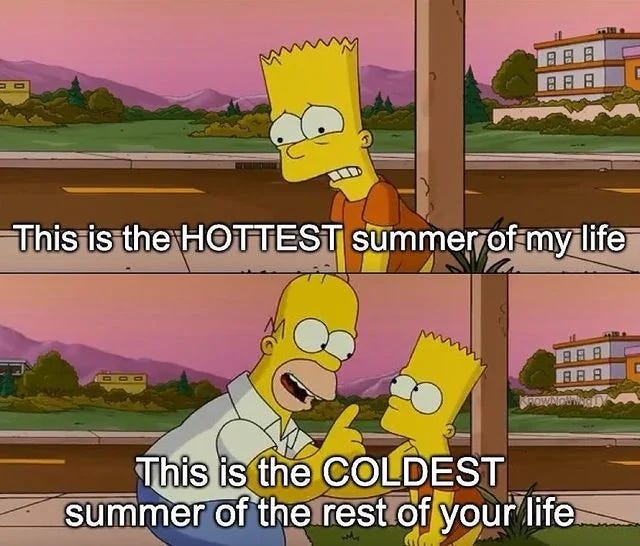Laughing at Climate Change
Don't Look Up, Hacks, and what my daughter taught me about how to cope
“Why are butts and poop funny?”
My seven year old, an obvious superstar, asked me the other night at bathtime. She had just come back from her first time at sleepaway camp, where I gather there was a fair amount of potty humor.
I answered her question seriously, with no fart noises, which was kinda boring of me, I know. But it was such a great question!
“People like to joke about things that make them feel weird or uncomfortable. It can be a way of managing our big emotions.”
“Oh, like about climate change?”
Record scratch. This kid. She is PAYING ATTENTION.
Climate change humor is increasing, says the New York Times. “From Hollywood movies like Adam McKay’s “Don’t Look Up” to independent sketches on YouTube and TikTok, comedians — no strangers to tackling difficult subjects — are increasingly looking for punchlines in one of the greatest existential threats ever to the planet”.
My friend sent me this amazing clip of Hannah Einbender the other day. She channeled the rage and exhaustion of the Earth herself. But funny.
“Humanity is a toxic abusive husband and climate change is just Planet Earth recognizing her worth ….”4.5 Billion years I put into this!! And then you think you can just POLLUTE me without PROTECTION and then move ON to another PLANET?”
I’m a big fan of Adam McKay’s work with Yellow Dot Studios, not only Don’t Look Up, but his parody ads, like this one “from” ExxonMobil:
Somewhat ironically, these days, I’ve had some trouble accessing my darker feelings about the climate crisis. We just lived through several of the hottest days ever recorded. Athletes are struggling through 95 degree weather at the Paris Olympics. Disasters are flashing through the headlines at a breathtaking pace. The Jasper wildfire in Canada. The Park Fire, now California’s fifth-largest. Destruction in Houston. Catastrophic flooding in Vermont. Monsoon mudslides in Kerala, in southern India, a place I visited and loved in 2008.
It’s all so familiar. So numbingly, shatteringly familiar even in its ever-increasing strangeness. We’re well inside the curve of the hockey stick now and we’re moving so fast that sometimes, I hate to say this, it all blurs together.
And I’m not suggesting we can laugh it off. But humor can be a less threatening way to raise the issue, to connect with others, to take the villains down a peg or two, to release our feelings and start a conversation.
As part of Climate Mental Health Network, I’ve been in touch with Swedish psychologist Maria Ojala to work on amplifying her research on coping with climate emotions. She has a new study out that looked at patterns of coping among adolescents and young adults.
Ojala has previously established a typology of 3 kinds of coping with climate emotions:
Problem-focused coping: actions you take to address a problem, like eating less meat, or protesting JD Vance
Emotions-focused coping, which can include denial, distancing, and distraction
Meaning-focused coping: how we deal with aspects of issues that are out of our control. This includes strategies that activate positive emotions, “such as benefit finding, positive reappraisal, and emphasizing trust”.
In the context of the climate crisis, meaning focused coping could include choosing to be grateful for the opportunity to take part in such an epic struggle for the future of humanity. Expressing admiration for climate heroes and comrades. Appreciating the natural beauty that surrounds you, even more so knowing just how fragile those living things can be. These reframes don’t take the negative feelings away. They allow positive and negative feelings to coexist, which keeps people motivated and engaged without burning out from anxiety or succumbing to despair.
In this study, Ojala found that
About a third of the teens were “avoidant.” They downplayed climate threats and used meaning-focused coping as a strategy on its own, expressing a shallow optimism—”People are working on it!”.
A quarter were “uninvolved,” apparently, doing their best not to pay attention at all.
But, 43% of the Swedish teens were “solutions oriented.” They combined a high degree of problem-focused coping with meaning-focused coping. They took action and moral responsibility for the climate crisis, but they also stayed aware that they weren’t alone and it wasn’t all up to them. They were both optimistic and pessimistic.
Everyone uses a mix of coping strategies to deal with life in general, and the climate crisis in particular. They all have a role.
Humor could be considered a form of emotions-focused coping, bringing distancing and distraction.
But I think climate humor can also enhance meaning-focused coping, by keeping the issue in our minds, increasing our tolerance for feeling more than one feeling at once and finding the bright side even in our struggles.
It could even be a form of problem-focused coping, like when you just go ahead and tell the CEO of ExxonMobil to eat shit.
And this, Elvy, is another example of why poop is funny.
Related: Humor is soaring in political speech right now: the couch meme ; a new book on climate change language:
““Imagination,” political scientist Manjana Milkoreit reminds us, “lies at the heart of social change.” Facing climate crises, it’s through imagination, or what Milkoreit calls “socio-climatic imaginaries,” that we perhaps can best collectively “describe attainable futures.” Flexing our “ideational power,” she says, “facilitates the emergence of shared or collective beliefs” and can “motivate behaviors and decisions.”









Great blog Anya. Thanks. x